Mohammad Shabangu, a Black South African academic, analyzes the unspoken and accepted censorship around the question of Palestine in his U.S. classroom.
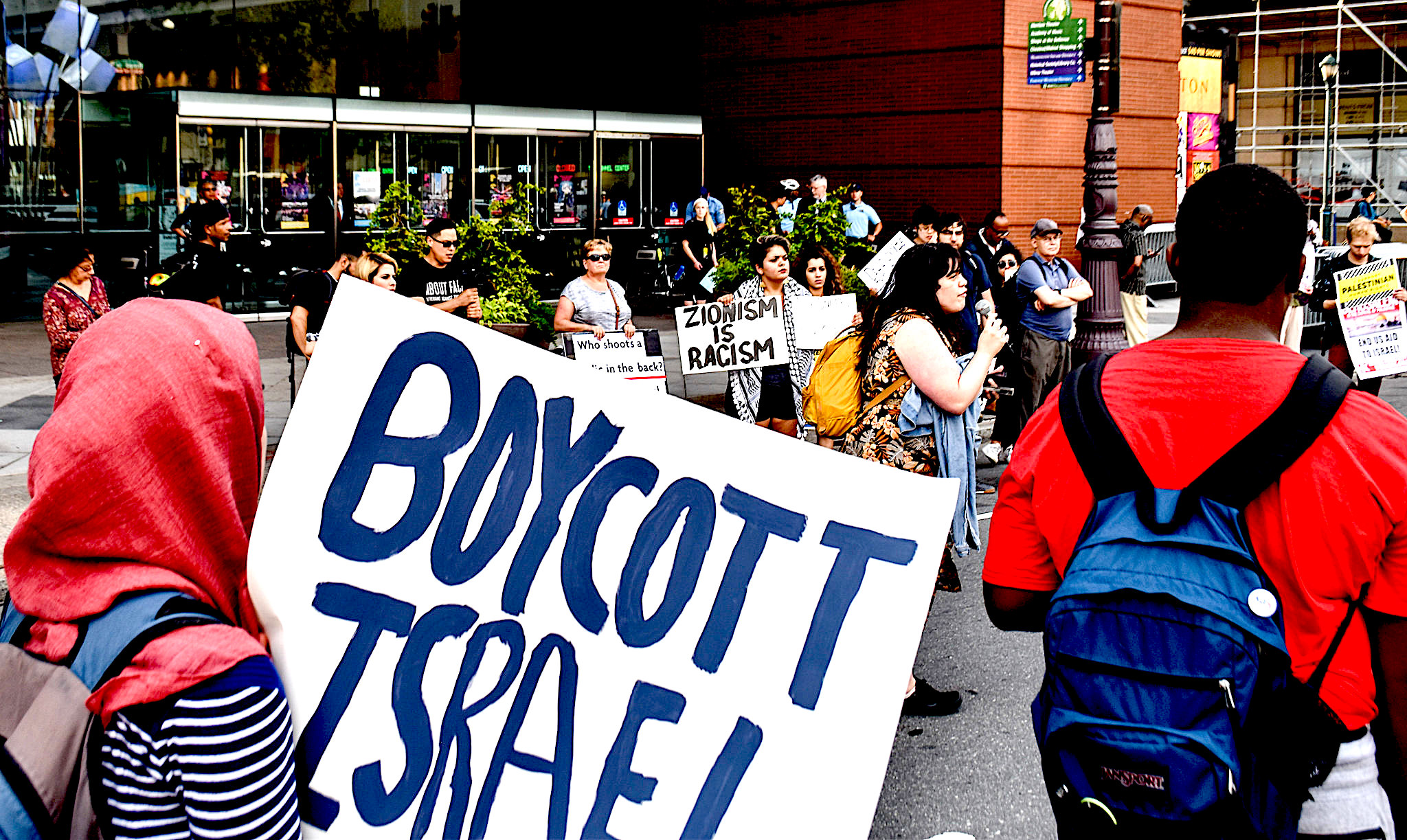
June 8, 2018: Palestinian solidarity demonstration in Philadelphia. (Joe Piette, Flickr, CC BY-NC-SA 2.0)
By Mohammad Shabangu
Africa is a Country
 Recent weeks have proven that the brutal character of the Israeli military cannot be overstated. As witness to the atrocities taking place in Gaza, the world is yet again at a loss for adequate words, unable to explain the vehement bloodlust of an unaccountable oppressor state. While this is hardly a controversial subject in many countries, by contrast in the United States where news outside the bubble rarely takes hold, one nevertheless feels an awkward silence when it comes to the occupation of Palestine.
Recent weeks have proven that the brutal character of the Israeli military cannot be overstated. As witness to the atrocities taking place in Gaza, the world is yet again at a loss for adequate words, unable to explain the vehement bloodlust of an unaccountable oppressor state. While this is hardly a controversial subject in many countries, by contrast in the United States where news outside the bubble rarely takes hold, one nevertheless feels an awkward silence when it comes to the occupation of Palestine.
The Palestinian-American cultural critic Edward Said maintained that any long-term justice beyond survival and interim calls for ceasefires will have to include a type of cultural movement, shifting the battleground from an uneven field in which Palestinians’ only defense against their aggressive colonizer is throwing stones and exposing themselves “to the depredations of the Israeli military.”
Said appreciated that a program of condemnation would have to be worked at, in the same way that Israel has kept itself busy within American society, manufacturing consent to kill Palestinians by gripping the hearts of many Americans.
Perhaps because he lived in the U.S. through a period when the image of Islam was being concretized as the paragon of evil in the American popular imaginary (that is as terrorism), Said had an intimate view of the levers of power from the other side of the dynamic; he saw the importance of displacing Israel’s monopoly on the American public’s sympathies.
Therefore, he saw that the struggle for Palestinian self-determination had to include a concerted and organized effort on the part of the Palestinian diaspora, that it cannot avoid the task of wrenching American popular culture from its ignorance and moral apathy regarding the occupation.
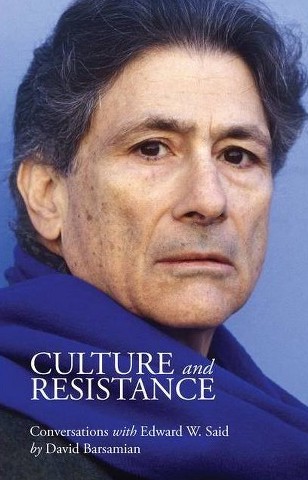 Just a few months before he died in 2003, Said noted in his book of interviews, Culture and Resistance, that “the Palestinian elites, intellectuals and others, still think that there’s a shortcut to influencing America, which is the main actor in this besides Israel.”
Just a few months before he died in 2003, Said noted in his book of interviews, Culture and Resistance, that “the Palestinian elites, intellectuals and others, still think that there’s a shortcut to influencing America, which is the main actor in this besides Israel.”
Reading this today rings frustratingly true, one knows the truth of matter deep down, and yet it is hard to think that the key to curtailing the barbarisms of Israel lies not only in the hands of a proxy U.S. government, but in the hearts and minds of ordinary Americans.
And judging by the U.S. mediascape, America has a terribly allergic reaction to the most basic facts about Israel. In addition to America’s continued denial of the impact and reach of slavery, in addition to its own track record of institutionalized and everyday racism; there is yet an added difficulty in influencing this particular public conscience, owing to a stifling atmosphere that persists, the result of an unspoken and accepted censorship around the question of Palestine.
Said recognized that such an atmosphere was sustained by
“a massive propaganda effort on the part of Israel, which has employed public relations firms in the United States, has the entire U.S. Congress at its beck and call, and has an enormous amount of financial, political, and other resources blocking any effort at the UN to protect Palestinians against Israeli military onslaught.”
I have experienced the effect of this at some point. For instance, I teach a course on post-apartheid literature at an elite New England private college. The class involves some scaffolding of the history of South Africa, and early on a screening of “From Selma to Soweto,” the sixth episode of the Emmy Award winning documentary series Have You Heard from Johannesburg.
This episode provides a chronicle of the Boycotts Divestments and Sanctions (BDS) movement started by African-American grassroots collectives who were determined to organize against U.S. complicity with the South African apartheid regime in the 1980s.
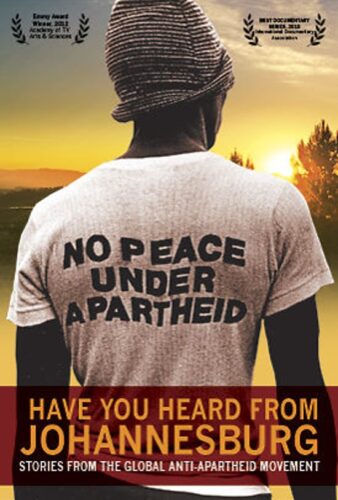 The campaign gathered momentum as students across American campuses engaged in direct action that included sit-ins, petitions and other disruptive efforts that made them instrumental in changing American popular opinion towards the apartheid regime.
The campaign gathered momentum as students across American campuses engaged in direct action that included sit-ins, petitions and other disruptive efforts that made them instrumental in changing American popular opinion towards the apartheid regime.
The film documents how BDS, directed by grassroots movements who later enlisted college students to their cause, eventually and effectively strong-armed a recalcitrant President Ronald Reagan (along with some of their own university presidents) into imposing economic sanctions and cutting ties with companies that had business interests in South Africa.
Although initially a tough sell to a certain generation of white Americans, BDS eventually managed to position itself not only as a legitimate response to human rights violations in South Africa, but also as a moral obligation to “decent Americans.”
The BDS campaign against the apartheid government in South Africa holds lessons about the role of complicity with a tyrannical nation and government. When I ask students to reflect on the resemblance of South African and Israeli apartheid, I notice a type of sentimentalist affection that gets in the way of the discussion. Try as they do to conceal it, I immediately sense a squirminess set in, accompanied by contagious and rapid foot tapping or some other nervous tick.
Sensing the weight of the silence, I realize that I’ve crossed an emotional danger zone, and I conclude that like me, they must somehow expect that even mentioning Israel’s occupation and the violence towards Palestinians can quickly alter the mood in a room. I say to them that, in any case, most companies in Israel are not Jewish or Israeli companies but multinational entities operating out of or headquartered in Israel and, therefore, implicated in the apartheid regime’s bloodletting and the death drive of its political and military infrastructure.
“Sensing the weight of the silence, I realize that I’ve crossed an emotional danger zone.”
What I extrapolate from my experience in an elite American classroom is that extending the epistemic parameters of Americans about their own positionality would entail two major tasks. Firstly, getting them to see Israel’s 1948 moment as coeval with apartheid South African’s 1948, that they not only share a birthday (both established in the month of May 1948), but that from inception both states had been exchanging notes on how to put into practice their desire for an ethnically stratified society while the primary collusion of the U.S. helped maintain the prolonged violation of customary international law in respect to both regimes.
It’s astonishing how difficult it is for many of my mostly white American students to overcome their cognitive dissonance and wrap their heads around such synergies, confronting their own country’s proud sponsoring of terrorism and dispossession. While it’s easy for progressives and young centrist-liberals to retrospectively get on board with BDS in South Africa, I suspect that a significant number of them would consider BDS in relation to Israel to be anti-semitically inflected if not an act of outright discrimination, even where they may value the non-violent qualities of BDS over other type of actions.
We may consider applying the notion of apartheid to other contexts where it might be said to operate under different names. The ultimate task would be to get them to be confident with the notion that denouncing Israel or Zionism and their own country’s endorsement of Israeli policies cannot be equated with disfavoring or hating Jews/Judaism, that there is furthermore something rather anti-semitic in the unquestioned congruity of that equation.
I try to help students understand that democracy entails accepting responsibility for their position as U.S. citizens, as in “the ability to respond” to what is done in their name and to decide how they will petition their government for action.
But to do this, they will have to flip the narrative about discrimination and antisemitism that is currently used to repress any expression of dissent against the prevailing attitudes, and only works to shield the government of Israel from all criticism.
How does one prepare students to take the mental leap from the idle state of a silent observer, or worse, the disgraced complicity of one who, faced with bare evidence, ignores the injustice, to help them respond with a more productive indignation that would have them actually act upon their convictions? The task is more difficult when people fear the charge of antisemitism.
Iran Sanctions
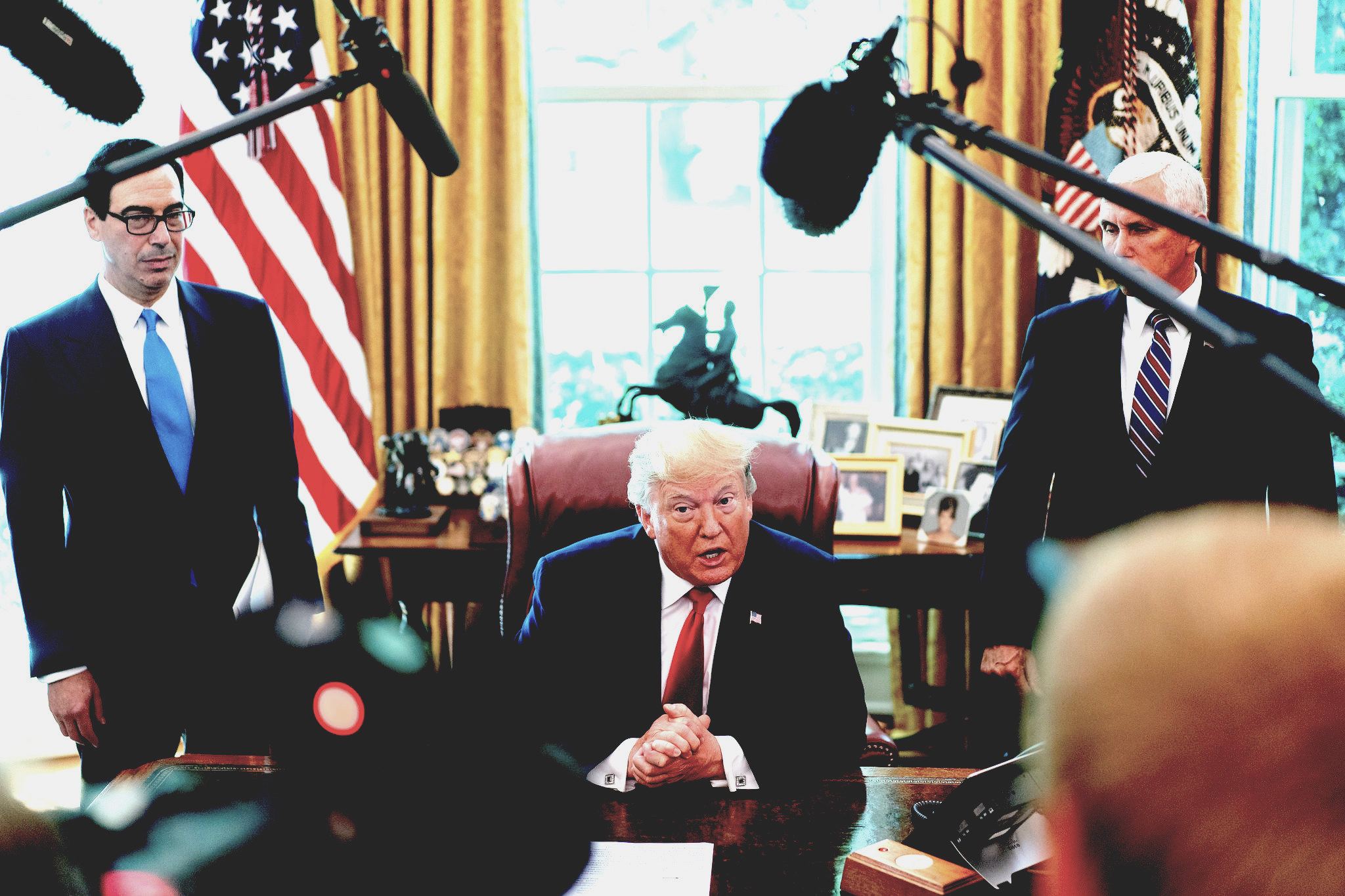
June 24, 2019: President Donald J. Trump, joined by Vice President Mike Pence and Treasury Secretary Steven Mnuchin, with reporters before signing further sanctions on Iran. (White House, D. Myles Cullen)
Despite that, 2020 saw political tensions on the global stage heightened by U.S. sanctions targeted at Iran. That this goes unremarked should help make the point about the baselessness of the blanket charge of antisemitism and the manner in which it has been weaponized by those who deny Israeli apartheid.
It tells us that it is possible, after all, to conceive of U.S. sanctions against a religious-identifying government, Tehran, as neither religiously motivated nor directed at all Muslims or Islam “as such” but instead as an action apparently informed by a considered governmental response solely towards its policies.
So I realize that many Americans simply do not know — and indeed how could they, given the navel-gazing posture of U.S. news networks — that in reality the actual victims of the Israeli state’s aggression are the 5 million Palestinians who are violently evicted from their homes twice and thrice over decades; who are rendered stateless; who have lived through a lifetime of collective punishment, afflicted by merciless killings of innocent civilians like flies to wanton boys; affected by checkpoints that impede freedom of movement; relegated to what amounts to crowded bantustans, permanently walled in and encircled by an Israeli military that hunts them down and periodically airstrikes them while they sleep, destroying swaths of residential units in the process.
They don’t really know about Israel’s targeted destruction of economic and administrative infrastructure such as water and electricity supplies; they surely must not know about the pleasure and sense of accomplishment Israel derives from that, just so a few hundred settlers can claim their share of yet more illegally occupied territory. And through all of this, Israel can count on unconditional subsidy from U.S. taxes. They cannot begin to imagine the scale of the crimes against humanity that this silence has upheld for decades.
The Palestinian writer and poet Mohammed el-Kurd was asked a pathetic question during an interview on the private American cable news channel, CNN: “Do you support the violent protests that have erupted in solidarity with you and other families in your position right now?”
It was the kind of question that seeks to delegitimize Palestinian resistance at best and, at worst, has the effect of publicly “incriminating” those who are resisting occupation, earmarking them for further harassment by Israeli occupation forces. El-Kurd immediately responded with an ever more pressing question: “Do you support the violent dispossession of me and my family?”
Islamaphobia in America
While not surprising, the misgivings and dithering skepticism in response is instructional, it leads me to conclude what I instinctively know about the immense difficulty of mourning Muslim lives in the U.S.; that whether we are talking about the oppression of the Rohingyas in Myanmar, the Uyghurs in China, or the Hindu nationalist government’s actions towards Muslims in India and Kashmir, to say nothing of Israel’s ongoing brutalization of Palestinians, all these examples patently illustrate how for many Americans the term “Islamophobia” does not carry the same moral turpitude as the term “anti-semitic.”
“Islamophobia is considered a more superficial charge, whereas antisemitism is imbued with some sacred essence.”
And if the campus is even a minor indicator of the temperature at a national level, if one can extrapolate from there an insight about the allotment of American popular sympathies, one could further assert that the unfortunate lack of urgency that the term Islamophobia fails to conjure makes organizing against Muslim persecution in the same order of magnitude quite arduous if not virtually impossible.
Islamophobia is de facto a less serious offense or crime, as seen by the impunity with which much anti-Islamic behavior is carried out, from vitriolic expressions of enmity to more violent actions targeted at Muslims in manifestation of such enmity.
When has a well-known case of Islamophobia of a public figure ever led to anyone losing their job or being reproached, much less “held accountable” to the moral rubrics of a cancelling culture?
If one is hard pressed to recall such a situation, might it be because Islamophobia is a more superficial charge, whereas antisemitism is imbued with some sacred essence, a special kind of “sentience,” which might explain Americans’ identification with a self-serving nationalism that is undifferentiated from its own self-image?
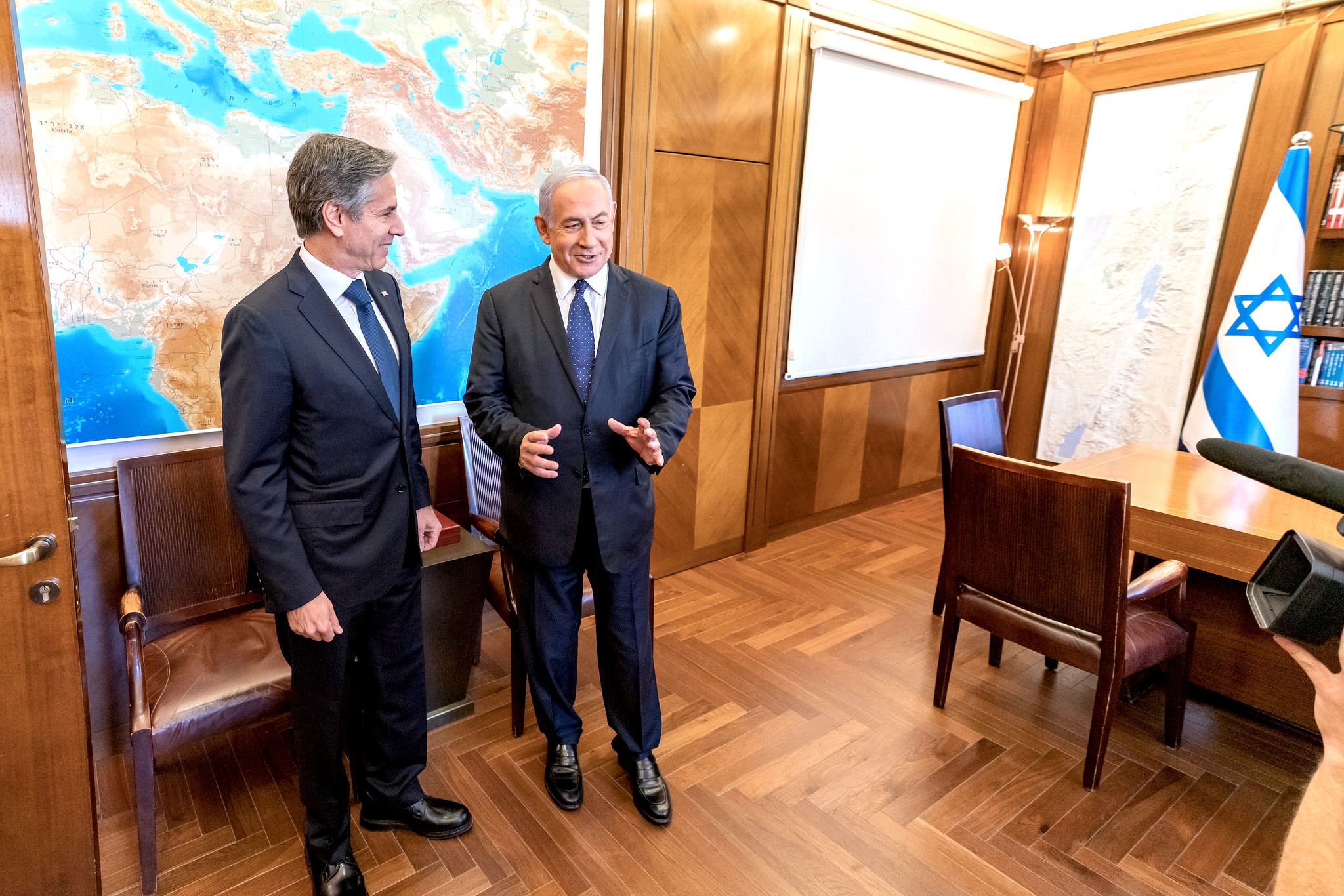
U.S. Secretary of State Antony Blinken meeting with Israeli Prime Minister Benjamin Netanyahu in Jerusalem, May 25. (State Department, Ron Przysucha)
No wonder then, that it can be fraught to hold activities under the banner of BDS at places such as Harvard University, on the basis that this constitutes discrimination against Jews, as its former president says.
By this standard, BDS and Israel Apartheid week @Harvard are anti-Semitic in both effect and intent.
— Lawrence H. Summers (@LHSummers) April 4, 2019
Given Harvard’s status as a policy incubator for so much insidious U.S. foreign policy, it’s no surprise that the U.S. consistently and unilaterally votes and vetoes as it does on the international stage on the subject of Israel, since this is in any event fully commensurate with its own domestic policies in that at least 42 states have anti-BDS laws that prohibit any state contractor from involvement in BDS. It’s not enough for the social stigma to exist, but dissent must be further criminalized.
Saree Makdisi writes a candid and scathing account of the consequences of this conditioned silence in U.S. institutions when he declares that “what has prevailed here [on U.S. campuses], is the virtual suspension of thought.” It’s been nearly two decades since Makdisi wrote about this state of affairs as it relates to BDS, decrying the anti-intellectual behavior of academic elites who refuse engagement on the question of Israel and Palestine, the avowed progressive who decides they would rather sit this one out, and who shuts down any discussion by claiming antisemitism in advance.
Meanwhile, as long as you don’t bring up Palestine, what can go unchecked, and what has indeed gone unchecked, is the real and life-threatening antisemitism that is on the rise in both the U.S. and, as ever, in Europe.
“BDS is an antidote to the anti-intellectual posture that leads to stasis.”
Solidarity and support for BDS will only trend upwards in the short to long term, as we have seen recently throughout several U.S. cities where pro-Palestinian protesters showed up in their tens of thousands.
A generation of progressives in America, both on the ground as well as public representatives like Rep. Rashida Talib, who is of Palestinian descent, frequently use terms like “apartheid,” “settler-colonialism” and “ethnic cleansing” to describe Israel’s ethno-nationalist character. Along with Rep. Ilhan Omar, Rep. Alexandria Ocasio-Cortez and Sen. Bernie Sanders, these progressive congresspeople introduced legislation to block America’s latest sale of weapons to Israel.
Through such intervention, we immediately understand that if the U.S. continues to sell Israel the very weapons it uses to commit its dreadful crimes against Palestinians then calls for peace do nothing but pay lip-service to justice.
The growing popularity of such measures indicates that Israel is beginning to lose its grip on U.S. public opinion, that its bewildering chicanery is an embarrassment to an awakening nation still battling a sleep paralysis induced by decades of unwittingly aiding and abetting the subjugation of Palestinians. But importantly, the vocal opposition to Israel’s state crimes is accompanied by action, and such action smooths the path for BDS to accelerate its drive and exert more pressure for divestment.
And to the extent that it has the potential to transform the public opinion of Americans in relation to the question of Palestine, BDS is an antidote to the anti-intellectual posture that leads to stasis, it requires people to align their minds, to be guided by their conscience in deciding to actively take a position against the violence they now know of and see on a daily basis. Americans should assert that they refuse to have their taxes diverted from their own institutions and channeled to prop up Israel’s war crimes and its continued violation of the most basic international laws.
They must refuse the vilification of BDS and challenge the counter measures that seek to silence “free speech.” Such reactionary measures are not merely facile recriminations, therefore anything shy of their rejection is tantamount to an active defense of oppression which, as Makdisi cautions, would
“articulate more than merely a logic of sympathy with Israel’s actions. And indeed, in many cases the position articulated by anti-divestment campaigners is not that Israel’s version of apartheid does not exist: it is that that apartheid is justified. This is neither paranoia nor denial, this is a gesture of active collusion, an altogether different matter.”
As much as I wish it were not so, Said was right that American popular opinion regarding Palestine will need to change along with the necessary political and material instruments of justice. BDS therefore has the potential to reframe approaches to the question of Palestine in the U.S.
As to the willful ignorance of people in top-tiered institutions especially, one way to reframe their mindset would be to think of BDS as an invitation to think, and think again. The success of BDS is not only in its future; its eternal achievement on campuses will be that at any moment it can snap people back from their indifference.
There must be an anti-apartheid campaign that emphasizes that the lives of Palestinians matter, and one wonders what it would take to evince such a response. When the call to end Israeli apartheid finally gains enough traction on campuses across the U.S., an effort which hitherto has been suppressed, BDS will have inaugurated a pivotal moment, as Makdisi asserts, “the point at which the possibility of thought returned once again to American university life.”
Mohammad Shabangu is an assistant professor at Colby College. He teaches and researches contemporary world literature.
This article is from Africa is a Country and is republished under a creative commons license.
The views expressed are solely those of the author and may or may not reflect those of Consortium News.


Thank you, Prof. Shabangu for such a clear revelation of Israeli apartheid for a long time being shoved down our throats under the
guise of democracy by our U.S. government oligarchy, et al, and the turn the fakery is taking especially with our young who will
not buy it.
Terrific article, Prof. Shabangu. Thank you for writing it and thanks to CN for republishing it. I would only point out that aid which continues to flow unabated to Israel is really just a subsidy to US arms manufacturers. Profit has no conscience. As I like to point out on social media (and, soon, in song), “The revenue streams shall not be infringed” (Amendment Zero).
That said, I recently penned an open letter at Medium that called out leftist rappers in Germany for their silence on Palestine. It’s astonishing how people who built their careers as conscious rappers, and who have rapped cogently about violence against ethnic others, turn a blind eye to one of the most oppressed and disenfranchised peoples on Earth. I reflect on why that could be and try to offer a way out through example. If anyone is interested, I’ll link to the piece below.
I’m working on a follow-up that discusses anti-BDS sentiments in the Left in Germany. Peace. TK
a wonderfully articulate article. Thanks so much to Mohammad Shabangu a committed academic to untwisting the thoroughly reprehensible and actually demented logic of support for the state of Israel.
thanks again!